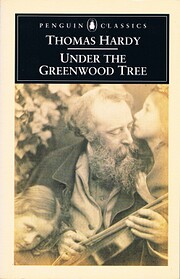

Click on a thumbnail to go to Google Books.
|
Loading... Under the Greenwood Tree (original 1872; edition 1998)by Thomas Hardy (Author), Tim Dolin (Editor)
Work InformationUnder the Greenwood Tree by Thomas Hardy (1872)

No current Talk conversations about this book. Under the Greenwood Tree" is the story of the romantic entanglement between church musician, Dick Dewey, and the attractive new school mistress, Fancy Day. A pleasant romantic tale set in the Victorian era, "Under the Greenwood Tree" is one of Thomas Hardy's most gentle and pastoral novels. Second book to be read in the local "Hardy Readers" bookgroup after Desperate Remedies. This is a shorter, lighter book that is also easier to read that Desperate Remedies. It is about a small local community, and the story starts with description of the "choir" (singers and musicians) who are going round the houses (often isolated) one Christmas night. They briefly glimpse sight of the new school teacher - Miss Day - who becomes the centre of attention. She and Dick Dewy fall in love, but their engagement faces obstacles from both her father and the fact that other men are vying for her hand. As a subplot the choir, who also accompany the mass, find that they will be ousted, to be replaced by a new organ, which the vicar has decided will be played by Miss Day, even though she has stated that she doesnt want to.. It is a much happier book than DR, has a more continuous flow in the narrative (although being split into 4 "seasons"). As I was not struggling with the narrative on this one, I was able to pay better attention to Hardy's descriptions of nature, and it was much more pleasing. When I started reading this book I was somewhat annoyed at the plethora of similes. I thought that Hardy might have been a bit like Ruskin who I believed to be very pleased with himself to the detriment of his storytelling. But, the book turned into a delightful story of a year in the lives of English country folk. It is centered around two young people who end up married and partying with their friends and family "Under the Greenwood Tree". A most enjoyable story. no reviews | add a review
Belongs to Publisher Series
Classic Literature.
Fiction.
Romance.
Historical Fiction.
HTML: Known for such novels as Tess of the d'Urbervilles and Far from the Madding Crowd, Thomas Hardy delves deeper into the genre of historical romance in this stirring portrait of the various entanglements and amorous intrigues that arise among a group of church musicians in rural England. Hearts are broken along the way, and though the novel ends with a wedding, did the right pair find each other in time? Under the Greenwood Tree is an engaging read that fans of historical romance will enjoy. .No library descriptions found. |
Current DiscussionsNonePopular covers
 Google Books — Loading... Google Books — Loading...GenresMelvil Decimal System (DDC)823.8Literature English & Old English literatures English fiction 1837-1899LC ClassificationRatingAverage: (3.5) (3.5)
Is this you?Become a LibraryThing Author. |
||||||||||||||||||||||||||||||||||||||||||||||||||||||||||||||||||||||||||||||||||||||||||||||||||||||||||||||||||||||||||||||||||||||||||
When you read the introduction to this novella, you learn that Hardy really wanted to write a story about a hamlet that was modernizing and leaving some of its inhabitants behind. For sure, the loss of the choir is sorely felt, but this is because of the "love" story that truly binds the whole tale together.
Dick and Fancy are two people who grew up in the hamlet of Mellstock, and they fall in love. They spend a lot more time getting acquainted in the book than the corresponding movie implies, but don't expect a great match like in Pride and Prejudice. These are simple, country folk, where Fancy represents a new era while Dick shows more reluctant progress, and in some cases, shows complete aversion to change. This is evident in the scene where he goes to a funeral instead of church on the day of Fancy's first performance.
Despite their differences, their love triumphs, which perhaps is to say change will always triumph over stagnation and the past, since Fancy is the main driver of the romance here. Of course, their love isn't without its secrets, which I won't give away here, but it's Hardy's way of reminding his readers that he isn't Jane Austen. His characters' love isn't pure, and things aren't as perfect as they seem. Since I like a little tragedy, I thought this was well worth the read. (